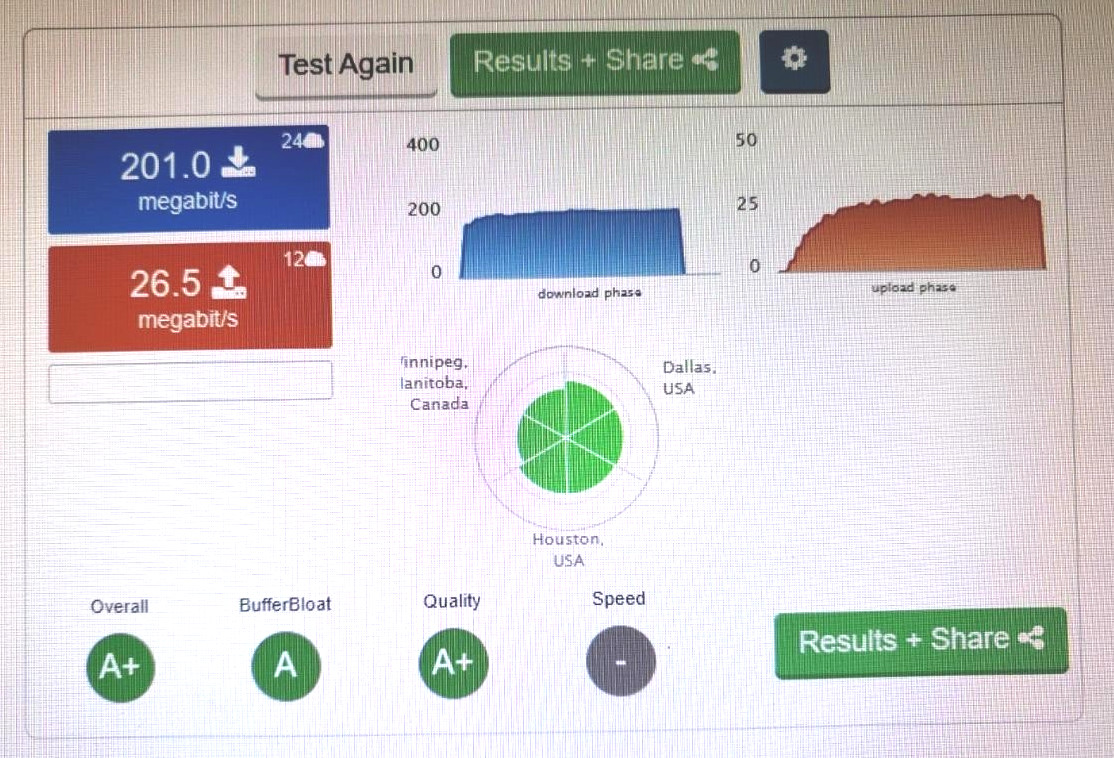| docs | ||
| ispConfig.py | ||
| LibreNMS_Integration.py | ||
| LibreQoS.py | ||
| LICENSE | ||
| README.md | ||
| scheduled.py | ||
| UNMS_Integration.py | ||
LibreQoS
LibreQoS is a python application that allows you to apply fq_codel traffic shaping on hundreds of customers. Fq_codel is Free and Open Source Active Queue Management algorithm that reduces bufferbloat, and can improve the quality of customer connections significantly. LibreQoS features the ability to import devices from LibreNMS and UNMS at runtime using API calls. It then apples hundreds of filter rules to direct customer traffic through individual fq_codel instances within an HTB (HTB+fq_codel). By utilizing hashing filters, thousands of rules can be applied with minimal impact on traffic throughput or CPU use. This is alpha software, please do not deploy in production without thorough testing. If you need a stable paid commercial alternative, please check out Preseem, which has great metrics tools and integration with many CRM and NMS platforms.
Features
- HTB + fq_codel
- Experimental support for CAKE (Common Applications Kept Enhanced)
- TC filters divided into groups with hashing filters to significantly increase efficiency and minimize RAM usage
Integration
- LibreNMS device import
- UNMS/UCRM device import
Requirements
- Edge and Core routers with MTU 1500 on links between them
- If you use MPLS, you would terminate MPLS traffic at the core router
- OSPF primary link (low cost) through the server running LibreQoS
- OSPF backup link

Server Requirements
- VM or physical server
- One management network interface
- Two dedicated network interface cards, preferably SFP+ capable
- Python 3
- Recent Linux kernel
- recent tc-fq_codel provided by package iproute2
Known limitations
- Linux TC filters are apparently not cleared from memory after being removed/disassociated with qdiscs. This leads to gradually increasing memory use. One solution is to reboot the VM or server once a week. With an OSPF setup that would mean just 10 or so total seconds of client downtime per week. Still, there must be a better solution. Please contact me if you know of a way to clear linux tc filters' memory usage without a reboot.
Adding the bridge between in/out interface NICs
- Add linux interface bridge br0 to the two dedicated interfaces
- For example on Ubuntu Server 20.04 which uses NetPlan, you would add the following to the .yaml file in /etc/netplan/
bridges:
br0:
interfaces:
- eth4
- eth5
Run LibreQoS
- Modify setting parameters in ispConfig.py to suit your environment
- Run:
sudo python3 ./LibreQoS.py
Running as a service
You can use the scheduled.py file to set the time of day you want the shapers to be refreshed at after the initial run. On linux distributions that use systemd, such as Ubuntu, add the following to /etc/systemd/system/LibreQoS.service
[Unit]
After=network.service
[Service]
WorkingDirectory=/home/$USER/LibreQoSDirectory
ExecStart=/usr/bin/python3 /home/$USER/LibreQoSDirectory/scheduled.py
Restart=always
[Install]
WantedBy=default.target
Then run
sudo systemctl start LibreQoS.service
Real World Performance
This customer is using a Ubiquiti LTU-LR CPE with QoS shaping applied at 215Mbps down and 30Mbps up.

Server Spec Recommendations
- For up to 1Gbps
- 4+ CPU cores
- 6GB RAM
- 32GB Disk Space
- Passmark score of 13,000 or more (AMD Ryzen 5 2600 or better)
- For up to 2Gbps
- 6+ CPU cores
- 8GB RAM
- 32GB Disk Space
- Passmark score of 17,000 or more (AMD Ryzen 5 3600 or better)
- For up to 5Gbps
- 8+ CPU cores
- 16GB RAM
- 32GB Disk Space
- Passmark score of 23,000 or more (AMD Ryzen 7 3800X or better)
- For up to 10Gbps
- 16+ CPU cores
- 32GB RAM
- 32GB Disk Space
- Passmark score of 38,000 or more (AMD Ryzen 9 3950X or better)
https://www.cpubenchmark.net/high_end_cpus.html
Special Thanks
Thank you to the hundreds of contributors to the cake and fq_codel projects. Thank you to Phil Sutter, Bert Hubert, Gregory Maxwell, Remco van Mook, Martijn van Oosterhout, Paul B Schroeder, and Jasper Spaans for contributing to the guides and documentation listed below.
References
- https://tldp.org/HOWTO/Adv-Routing-HOWTO/lartc.adv-filter.hashing.html
- http://linux-ip.net/gl/tc-filters/tc-filters.html
License
Copyright (C) 2020 Robert Chacón
LibreQoS is free software: you can redistribute it and/or modify it under the terms of the GNU General Public License as published by the Free Software Foundation, either version 2 of the License, or (at your option) any later version.
LibreQoS is distributed in the hope that it will be useful, but WITHOUT ANY WARRANTY; without even the implied warranty of MERCHANTABILITY or FITNESS FOR A PARTICULAR PURPOSE. See the GNU General Public License for more details.
You should have received a copy of the GNU General Public License along with LibreQoS. If not, see http://www.gnu.org/licenses/.